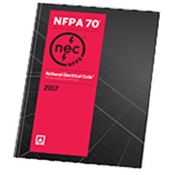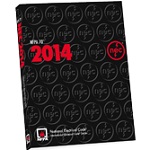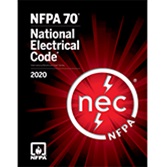PDF Standards NFPA (Fire) 70

PDF Standards NFPA (Fire) 70
Product Details
- Published:
- 08/12/2022
- ANSI:
- ANSI Approved
- Number of Pages:
- 917
- Note:
- This product is unavailable in Ukraine, Russia, Belarus

PDF Standards NFPA (Fire) 70
Click here to purchase
Hundreds of changes in the 2017 edition NEC® bring you up-to-code and ready to address new sources of electrical power.
Throughout the United States and around the world, NFPA 70®: National Electrical Code® (NEC) sets the foundation for electrical safety in residential, commercial, and industrial occupancies. The 2017 edition of this trusted Code presents the latest comprehensive regulations for electrical wiring, overcurrent protection, grounding, and installation of equipment.
NFPA 70: NEC has been published since 1897, and a rigorous process of review keeps it up-to-date with new technologies. In fact, more than 4,000 public inputs and 1,500 comments went into the 2017 NEC alone. Hundreds of updates and five all-new articles pave the way to a safe and efficient electrical future.
Major additions reflect the continuing growth in renewable power technology.The newest NEC addresses the advancement of privately owned wind and solar power generation and distribution equipment – including coverage of higher voltage systems that were once only the utilities’ domain. The new consumer role is a major factor in energy decentralization, and expanded NEC coverage is vital for designers, engineers, contractors, and AHJs.
- Large-Scale Photovoltaic (PV) Electric Supply Stations (New Article 691) covers systems that produce at least 5 megawatts (MW) of power, or enough to power 800+ U.S. homes.
- Energy Storage Systems (New Article 706) governs ESS installation, disconnection, shutdown, and safety labeling.
- Stand-Alone Systems (New Article 710) covers power production sources that are not connected to the grid, including PV and wind-powered systems.
- Direct Current Microgrids (New Article 712) concerns independent energy distribution networks that allow the utilization of power from dc sources to direct-current loads. Microgrids are on the rise worldwide.
Other NEC revisions protect the public and workers from deadly hazards.
- New labeling, such as detailed arc flash hazard warning on equipment, helps workers and supervisors assess electrical risks.
- New minimum space clearances for equipment installation clarify the safeguards needed to protect installers and maintainers.
- Fixed Resistance and Electrode Industrial Process Heating Equipment (New Article 425) presents needed regulations for industry.
- Revised provisions for AFCI and GFCI protection improve electrical and fire safety in homes.
Be prepared to protect lives and property in the ever-changing electrical landscape. Order the 2017 National Electrical Code.
Work with the latest requirements governing public and private buildings, homes, and structures; outdoor yards and lots; utility equipment; installations that connect to the power grid; and consumer-owned power generation systems and equipment. The 2017 NEC is better aligned with the safe work practices in NFPA 70E®: Standard for Electrical Safety in the Workplace®. (Softbound, Approx. 910 pp., 2017).
Product Details
- Published:
- 08/24/2016
- ISBN(s):
- 9781455912773
- Number of Pages:
- 910

PDF Standards NFPA (Fire) 70
Click here to purchase
Adopted in all 50 states, NFPA 70: National Electrical Code has saved untold lives with comprehensive requirements for electrical wiring and equipment. Stay ahead in your industry and be the first to get the 2014 NEC Code Book! States will soon be adopting the 2014 NFPA 70: National Electrical Code (NEC) as the new benchmark for electrical design, installation, and inspection. Having the 2014 NEC can help you meet Code, avoid violations and re-dos, pass inspections, and keep people and buildings safe from electrical hazards. Hundreds of changes have been made to the Code. In response to input from the field, major NEC revisions will impact electrical installations in residential, commercial, and industrial occupancies. Keep your work on the cutting edge of new electrical technologies, you’ll find updated coverage on 600-volt systems, larger installations, renewable systems, small wind electric systems, DC systems, and electric vehicle charging systems.
Product Details
- Published:
- 08/01/2013
- ISBN(s):
- 9780738184180
- Number of Pages:
- 921
- Part of:
- National Electrical Code(R)(NEC) and Handbook Set (NFPA 70), 2014 Edition

PDF Standards NFPA (Fire) 70
Click here to purchase
Please Note: NFPA has decided not to release the 2020 edition of the National Electrical Code as a PDF.
Prepare for the electrical challenges of tomorrow, today, with NFPA 70, National Electrical Code (NEC), 2020 edition.
The world never stops changing, so it’s crucial to keep learning how to keep it safe. Incorporated by reference in all 50 states and used across the globe, NFPA 70®, National Electrical Code® (NEC®), is the benchmark standard for electrical safety in residential, commercial, and industrial settings.
NFPA 70, NEC, was first published in 1897 and is continually put through a rigorous review process to keep it up to date with the most current industry practices, emerging trends, and the development and introduction of new technologies. The new NEC provides the latest requirements for safer and more effective electrical design, installation, and inspection, including provisions for wiring, overcurrent protection, grounding, and equipment.
Get up-to-code and prepared for the safety challenges of new sources of electrical power with the NEC, 2020 edition.
The revised and expanded NFPA 70, National Electrical Code, features state-of-the-art information for safe electrical practices for public and private buildings, homes and structures, outdoor yards and lots, utility equipment, installations that connect to the power grid, and consumer-owned power generation systems and equipment.
Content has been added, edited, and reorganized to address safety for workers, energy systems and electric vehicles, limited energy, and communication systems.
Impactful changes include:
- New requirements for exterior emergency disconnects of one- and two-family dwellings for improved electrical safety for emergency responders
- Revisions to service disconnect rules to help protect electrical workers from arc flash hazards
- Adapted and adjusted requirements for installation practices of new technologies to meet the evolving demand of power over Ethernet
- Updates to modernize tables currently in use for calculations to reflect improvements in energy efficiency and align with evolving codes
- Revised requirements for ground-fault protection within marinas and boatyards
- Introduction of guidelines for the safe use of electric vehicles (electric vehicle power export equipment) as a backup or emergency power source for a building or a home
- Reorganization of Article 310, including new user-friendly numbering for important ampacity tables, and new definition for cable bundle in Article 725
- Relocation of surge protection device requirements to new Article 242
- Revisions to alternative energy systems and electric vehicle requirements to clarify what portions of the PV system are covered by the requirements of Article 690 and the line side and load side connections of interconnected power supply sources, and to clearly distinguish energy storage systems from storage battery systems
- Reorganization of Article 800 to provide a general set of requirements to apply throughout the Chapter 8 articles
- Revisions to requirements for communications cables that are also carrying power to communication devices and revisions to the current limit for cables carrying power and data
The NEC, 2020 edition, introduces significant new requirements for:
- The residential installation of receptacle outlets serving island and peninsular countertops and for surge protection of services supplying dwelling units
- Working space for “housekeeping pads” for electrical equipment, the installation of wiring methods in exit enclosures, sizing supply and load conductors used with adjustable-speed drive systems, and AFCI protection of branch circuits in patient sleeping areas in care facilities
- Calculating the load of electric vehicle supply equipment with variable current settings
- Worker safety in identifying the source of power for disconnecting means and for egress from spaces containing large electrical equipment
- Grounding of disconnecting means installed on the supply-side of service disconnecting means
- Cables installed exposed on ceiling surfaces and sidewalls
- Special occupancies, special equipment, and special conditions, including installation of splash pads, the use of “Type P” cables in hazardous classified locations, and the reinspection of swimming pools and other bodies of water
Help protect life and property with the most relevant electrical requirements.
Get the cutting edge information you need to identify and overcome the latest hazards and complexities in electrical work. Order your copy of NFPA 70®, National Electrical Code, 2020 edition, today.
Product Details
- Published:
- 01/01/2020